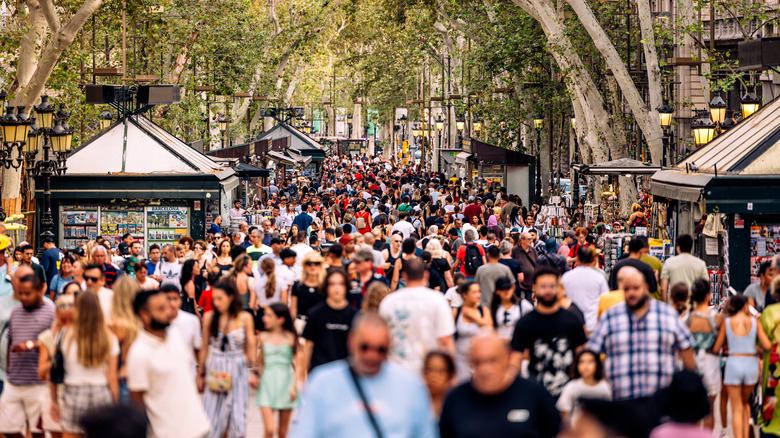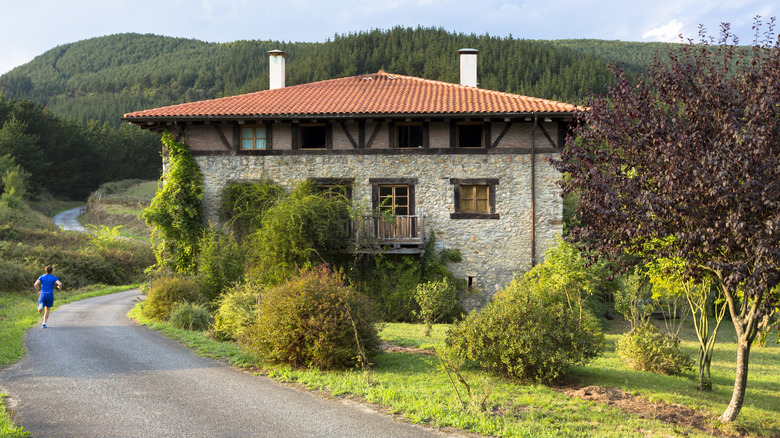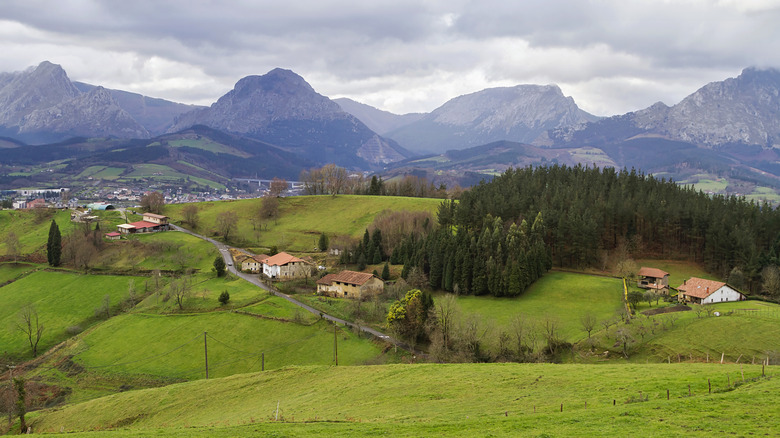Escape City Crowds With Spain's Secret And Surprisingly Affordable Airbnb Alternative
In recent years, media headlines have been dominated by news of protests across major European destinations against overtourism. Protestors in Spain have been particularly vocal, even spraying tourists with water pistols as they decry the extreme increase in the cost of living. In Barcelona, for example, the price of rental units doubled in the last decade and is now the same as the average monthly salary. Tourism hotspots in the country are facing pressure on their power and water supplies, an increase in pollution, noise, and traffic, as well as a loss of community, because locals can no longer afford to live in their own neighborhoods. What's worse, 31% of locals now view tourism as more harmful than beneficial. This has led the Spanish government to make efforts to combat rampant overtourism, including taking aim at unlicensed Airbnb rentals in tourist-flooded cities. So, if you were planning your next vacation to Spain, you may be wondering whether you should even go. Well, there are ways to be a responsible traveler — you can avoid the places that have been hardest hit by overtourism (Seville, Madrid, Barcelona, Mallorca, and Ibiza). Instead, opt for a "casa rural," escaping city crowds and enjoying a more pleasant stay.
Casas rurales, which translates literally to rural or country houses, can be anything from old farmhouses to cave dwellings, and they're typically found in rural areas. These structures have been converted into guesthouses, providing visitors with a more authentic experience. They can also be a surprisingly affordable alternative to city-based hotels and Airbnbs — for instance, in Madrid, a standard three- or four-star hotel room can cost well over $400, while an Airbnb rental home is at least $100. Meanwhile, depending on the region, the nightly rate per person at a casa rural could be less than $20.
Finding your perfect casa rural in Spain
While these accommodations are grouped under the general category of "casas rurales," they can be as different as night and day. There is no one-size-fits-all casa — they each have their own special features and charm. So whether you're a luxury jetsetter yearning for a romantic getaway with five-star amenities, or a pet-owning budget traveler looking to find woodsy trails to explore with your pup, you'll find the stay that's perfect for you.
Enjoy forested paths and untouched nature at the spacious, five-bedroom Casa Rural Azpikoetxea, a restored manor dating back to the 1700s, located between Pamplona and San Sebastián in the historical Navarre region of northern Spain. Hide away underground at Cuevas del Pino, a gorgeous troglodyte dwelling situated on a 60-acre organic farm in Villarubia, near Córdoba. This home is solar-powered and has been carved into the ancient stone quarry, which may date back to the Roman era. In the Alicante region of southeastern Spain, Refugio Marnes offers earthy rooms in an old Valencian farmhouse on the Costa Blanca. And if you're planning to undertake the Camino de Santiago route, Europe's famous, scenic hike through history that's equivalent to the Appalachian Trail, you'll find casas rurales aplenty along or nearby many sections of the path. Staying in these comfortable cottage homes will allow you to rest your weary legs while experiencing the region's culture and natural beauty.
Whichever casa rural you decide to book, ensure that you maximize your stay by immersing yourself in the regional culture and outdoor activities. Visit local markets, chat with your host, wander through verdant forests, and take part in farming activities, if offered. In this way, you'll turn a simple trip to Spain into a memorable holiday filled with inspiration and true connection.
How to book casa rurales and what to know before you go
Casas rurales can be reserved on a variety of sites, including popular platforms like Booking.com, Agoda, and even Airbnb (often listed under farmstays). However, there are also sites specifically dedicated to helping you find these niche homes. Farm Stay Planet is a collection of high-quality, agro-tourism accommodations. While it has limited budget-friendly choices, its carefully curated list will provide you with some of the most charming, eco-luxe stays you can find in Spain, from a five-star vineyard in Catalonia to a working organic farm in northern Andalucía. The website Rusticae, similarly, offers access to boutique hotels and rural houses, primarily across Portugal and Spain. The platform's team selects small-scale, independent places with a unique story and regularly audits members to ensure they're providing a high-quality, personalized experience. For a wider variety of casas rurales, including several low-cost options, Holiday Cottages To Rent is your go-to platform. You can sort the houses by village, county, or province, price, amenities or services offered, and proximity to attractions (ski slopes or beaches) in order to find your ideal spot.
Of course, booking a room in a casa rural isn't going to immediately solve the problems caused by the heavy influx of visitors to Spain. This will require government interventions, such as tourist taxes, short-term rental caps and bans, and cruise-ship docking restrictions, some of which have already been introduced. However, as an individual, you can make efforts to travel more sustainably by avoiding packed cities during peak season, being respectful of local culture and traditions, trying to minimize waste, and supporting family-run businesses rather than global chains. These steps will help ensure that Spain doesn't continue to be one of the most beautiful destinations in the world sadly ruined by overtourism.


